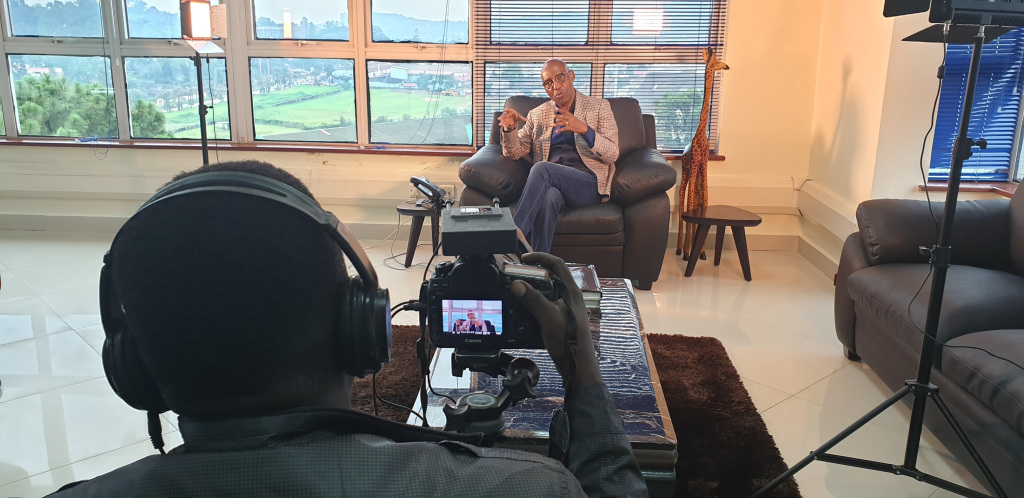Telecommunications operators have up to 30th January 2020 to formally notify the Uganda Communications Commission (UCC) which license categories they want to apply for under the new licensing regime.
Having concluded a review of the new licensing framework for the telecommunications sector and approved various license categories, the UCC recently wrote to concerned telecom operators and service providers confirming the new terms and reminding them to submit their expression of interest within the stipulated timelines.
Current operators had been given sixty (60) days from the 29th of October 2019 within which to formally write to the Commission indicating which license(s) they wish to be considered for.
However, the deadline has now been extended to 30th January 2020 to allow for adequate consultations.
The new licensing framework, which is to come into force by June 30, 2020, was presented to all current and prospective operators at the Commission’s offices on 29th October 2019.Explaining the rationale of the framework to the top executives of telecoms, the UCC Executive Director Godfrey Mutabazi noted that the last such review was conducted in 2016.
Mutabazi said the new framework, which has been arrived at after a comprehensive consultative process, will boost investment in the sector and ultimately improve the quality of telecommunications services.
The Commission’s Head of Legal Abudu Sallam Waiswa, who led the presentation, said the new framework aims to:
a) Ease market entry and enhance competition
b) Intensify the rollout of broadband Internet
c) Enhance local ownership of telecom services
d) Promote effective utilisation of available resourcesHighlights of the new framework include a requirement for national telecom operators to float at least 20% of the shares on the Uganda Securities Exchange within two years of acquiring the new license.
In his letter of December 10, 2019, the UCC Executive Director outlined the six license categories, and also highlighted newly introduced authorisations that cater for related telecommunications services. Below are the categories and authorisations alongside their terms and conditions:
(1) National Telecom Operator (NTO) license
This licence shall be granted to an operator that demonstrates financial and technical capacity to establish and operate a telecommunications network spanning across the entire geographical boundary of Uganda. The NTO license will allow the license holder to establish and provide both telecommunications infrastructure and services across the whole country. The NTO license shall be for a period of 20 (twenty) years, renewable in accordance with the Uganda Communications Act 2013.
The following are some of the salient features of this license:
(a) The licensee shall be eligible for national spectrum allocation based on technical expansion/ development plan, legal and regulatory framework, public interest and availability of the respective resources.
(b) The licensee shall be obliged to host and/or provide infrastructure services to PSP licensees within their respective licensed zones.
(c) The licensee shall be obliged to host and/or lease to or from other National Telecommunications Operators and/or PIP license holders for network rollout and provision of infrastructure services within licensed zones.
(d) The licensee shall be obliged to share active and passive infrastructure, including National roaming.
(e) The licensee shall be required to list at least 20% per cent of its shares on the Uganda Securities Exchange (USE) within two (2) years from the date of grant/ issuance of the license. This shall be undertaken in accordance with the existing listing rules as prescribed by the Uganda Capital Markets Authority.
(2) National Public Service Provider (NPSP) License
This license shall be granted to persons who intend to provide telecommunications services to the public. This license will allow the licensee to provide either Voice and Data services or Capacity Resale Services across Uganda.
The following are the key features of the NPSP license:
(a) The licensee will be authorised to provide either Voice and Data services or Capacity Resale Services across Uganda.
(b) The licensee shall not be allowed to install or otherwise provide infrastructure services.
(c) A holder of this license shall be required to provide its services through the network/ infrastructure of a licensed NTO or any other licensed public infrastructure service provider.
(d) A holder of this license shall not be eligible for spectrum assignment. The license shall be for a period of 5 (five) years, renewable in accordance with the Uganda Communications Act 2013.
(3) Regional Public Service Provider (RPSP)
This license will allow the licensee to provide either Voice and Data services or Capacity Resale Services in a specific region within Uganda. The licensee shall not be permitted to provide services outside of their licensed region(s) and shall not be eligible for spectrum assignment.
This license will allow the licensee to provide services in any one or two region(s) in Uganda. The following are the key features of the RPSP license;
(a) The licensee shall be authorised to provide either Voice and Data services or Capacity Resale services to the public in the region(s) covered by the license.
(b) The licensee shall not be allowed to provide service(s) outside of their licensed region and shall not be eligible for spectrum assignment.
(c) An operator can only hold up to 2 regional licenses. Once the licensee applies to provide services in a third region, the Commission shall evaluate and assess such operator’s eligibility for a National Public Service Provider license.
(d) RPSP license holder shall provide service through the infrastructure of any licensed NTO, NPIP or RPIP.
This license shall be for a period of 5 (five) years, renewable in accordance with the Uganda Communications Act 2013.
(4) National Public Infrastructure Provider (NPIP) License
This license shall be granted to persons who intend to provide telecommunication infrastructure services to licensed operators across the entire geographical boundary of Uganda. A NPIP licensee shall be entitled to provide infrastructure services to licensed National Telecom Operators, Public Infrastructure Providers, Public Service Providers and Private Networks in Uganda.
The following are some of the critical features of the NPIP license;
(a) This license will allow the license holder to establish, install and provide infrastructure services throughout Uganda.
(b) A NPIP licensee shall be authorised to provide infrastructure services to licensed National Telecom Operators, Public Infrastructure Providers, Public Service Providers and Private Networks in Uganda.
(c) Holders of this license will not be allowed to provide services to final consumers, except where the operator also holds a PSP license.
(d) Depending on the licensee’s technical plan, a holder of NPIP license may be assigned spectrum.
(e) The license shall be for a period of 15 (fifteen) years, renewable in accordance with the Uganda Communications Act 2013.
(5) Regional Public Infrastructure Provider (RPIP) License
This license will be granted to persons who intend to provide telecommunications infrastructure services to licensed operators in one or two region(s) in Uganda. The following are some of the key features of the RPIP license;
(a) This license will allow the holder to install, establish and maintain telecommunications infrastructure services in a specific region(s).
(b) A RPIP licensee shall be authorised to provide infrastructure services to licensed National Telecom Operators, Public Infrastructure Providers, Public Service Providers and Private Networks in the specific region(s). An operator may only hold one or two regional PIP license(s).
(c) Holders of this license will not be allowed to provide services to final consumers, except where the operator also holds a PSP license.
(d) Depending on the licensee’s technical plan, a holder of RPIP license may be assigned spectrum. The license shall be for a period of 15 (fifteen) years, renewable in accordance with the Uganda Communications Act 2013.
(6) License to provide Communal Access
This license will be granted to persons who intend to provide communal access to telecommunications services in Uganda. These license targets persons that may wish to connect specifically defined communities to telecommunications services.
A community shall, for this purpose, include a group of persons living in the same geographical location, having particular characteristics and interests in common. The following are some of the key features of the Communal Access license;
(a) A holder of communal access license will be authorised to establish, operate and provide communal access to telecommunications services to a particular community.
(b) An applicant for this license must provide evidence of finance and technical capacity to enter into a contract with a licensed provider(s) of telecommunications services in Uganda for purposes of providing communal access to the targeted community.
(c) This license is typically suitable for community-based, not-for-profit entities that may wish to provide subsidised telecommunications services to the unserved or underserved communities.
(d) The license shall be for a period of five (5) years renewable in accordance with the Uganda Communications Act 2013.
In addition to the above licenses, the Commission also introduced the following four classes of authorisations to cater for providers of other incidental telecommunications services:
(a) Equipment Distribution Authorisation. This will be granted to persons who deal strictly in the distribution and sale of telecommunications equipment, including network and customer terminals.
(b) Equipment Vending and Installation Authorisation. This will be granted to persons that intend to import, vend, install and maintain telecommunications equipment,
(c) Authorisation to Manufacture. This will be granted to persons who intend to set up manufacturing/ assembly plants for telecommunications equipment. UCC’s main objective will be to ensure that the equipment meets the set standards.
(d) Authorisation for Disposal of communications equipment. This will be granted to persons who intend to engage in the business of disposing of communications equipment.
In accordance with section 5(1) (v) of the Uganda Communications Act, 2013 and Part VII of the Uganda Communications (Licensing) Regulations 2019, the Commission also introduced the following authorisations for persons desirous of providing value-added services.
(i) Authorisation to provide Digital Financial services. This will cover all persons engaged in the provision of digital financial services, including electronic financial non-banking services. This authorisation will apply to all providers of Mobile money services, Mobile electronic payment solutions, mobile-based lending services, among others.
Persons who provide such digital financial services through telecommunications infrastructure shall be required to apply for and obtain this authorisation.
(ii) Authorisation to provide Digital Audio-visual content. This will be granted to persons who create, package and make available to the public digital audiovisual content through the telecommunications infrastructure. This will also apply to providers of communication aggregation services.
(iii) Authorisation to establish, maintain and operate an Internet Exchange Point. This will be granted to persons that wish to establish, install and operate an internet exchange point in Uganda. All authorisations shall be for a period of five (5) years. Still, the holder will be required to obtain an Annual Compliance Certificate from the Commission upon satisfaction of the compliance obligat





